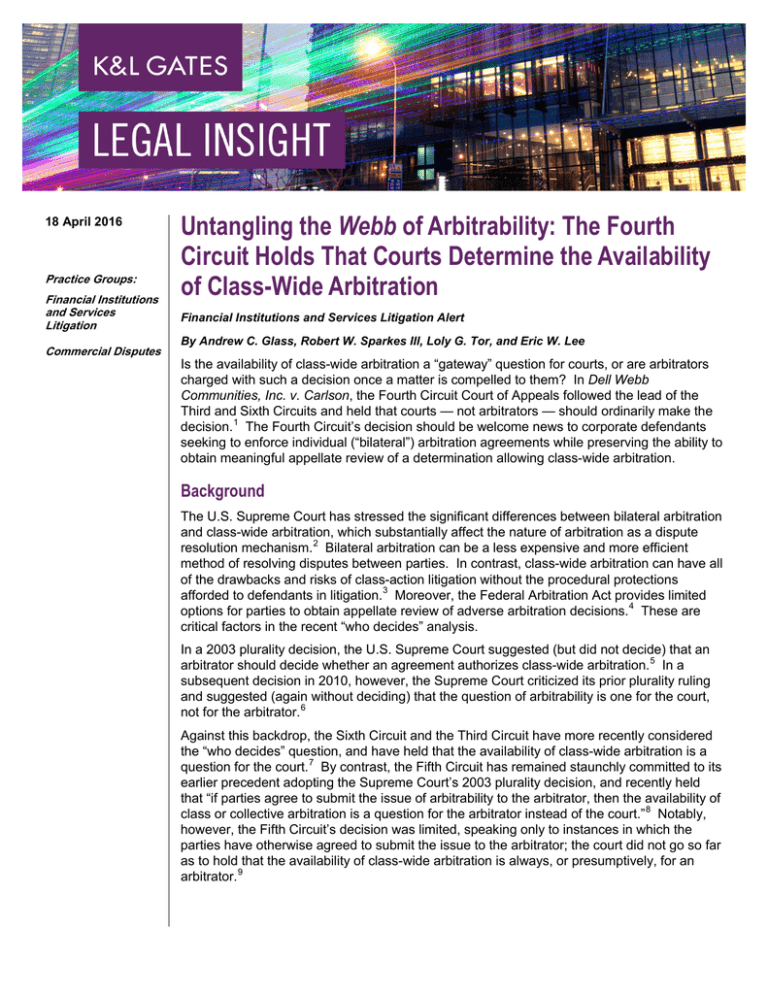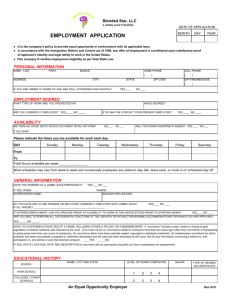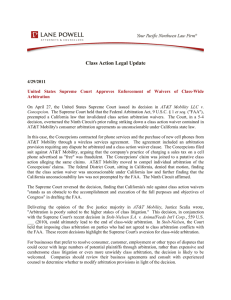
18 April 2016
Practice Groups:
Financial Institutions
and Services
Litigation
Commercial Disputes
Untangling the Webb of Arbitrability: The Fourth
Circuit Holds That Courts Determine the Availability
of Class-Wide Arbitration
Financial Institutions and Services Litigation Alert
By Andrew C. Glass, Robert W. Sparkes III, Loly G. Tor, and Eric W. Lee
Is the availability of class-wide arbitration a “gateway” question for courts, or are arbitrators
charged with such a decision once a matter is compelled to them? In Dell Webb
Communities, Inc. v. Carlson, the Fourth Circuit Court of Appeals followed the lead of the
Third and Sixth Circuits and held that courts — not arbitrators — should ordinarily make the
decision. 1 The Fourth Circuit’s decision should be welcome news to corporate defendants
seeking to enforce individual (“bilateral”) arbitration agreements while preserving the ability to
obtain meaningful appellate review of a determination allowing class-wide arbitration.
Background
The U.S. Supreme Court has stressed the significant differences between bilateral arbitration
and class-wide arbitration, which substantially affect the nature of arbitration as a dispute
resolution mechanism. 2 Bilateral arbitration can be a less expensive and more efficient
method of resolving disputes between parties. In contrast, class-wide arbitration can have all
of the drawbacks and risks of class-action litigation without the procedural protections
afforded to defendants in litigation.3 Moreover, the Federal Arbitration Act provides limited
options for parties to obtain appellate review of adverse arbitration decisions. 4 These are
critical factors in the recent “who decides” analysis.
In a 2003 plurality decision, the U.S. Supreme Court suggested (but did not decide) that an
arbitrator should decide whether an agreement authorizes class-wide arbitration. 5 In a
subsequent decision in 2010, however, the Supreme Court criticized its prior plurality ruling
and suggested (again without deciding) that the question of arbitrability is one for the court,
not for the arbitrator. 6
Against this backdrop, the Sixth Circuit and the Third Circuit have more recently considered
the “who decides” question, and have held that the availability of class-wide arbitration is a
question for the court. 7 By contrast, the Fifth Circuit has remained staunchly committed to its
earlier precedent adopting the Supreme Court’s 2003 plurality decision, and recently held
that “if parties agree to submit the issue of arbitrability to the arbitrator, then the availability of
class or collective arbitration is a question for the arbitrator instead of the court.” 8 Notably,
however, the Fifth Circuit’s decision was limited, speaking only to instances in which the
parties have otherwise agreed to submit the issue to the arbitrator; the court did not go so far
as to hold that the availability of class-wide arbitration is always, or presumptively, for an
arbitrator. 9
Untangling the Webb of Arbitrability: The Fourth Circuit Holds That
Courts Determine the Availability of Class-Wide Arbitration
Analysis
Enter the Fourth Circuit. In Dell Webb, the Fourth Circuit reviewed the district court’s
decision denying the defendant’s petition to compel individual arbitration and for a
declaratory judgment that the parties did not agree to class arbitration.10 The district court
had primarily relied on the Supreme Court’s 2003 plurality decision in holding that whether
an agreement permits class-wide arbitration “concerns the procedural arbitration
mechanisms available” to the plaintiffs and “is therefore a question for the arbitrator rather
than for the court.” 11
The Fourth Circuit reversed, holding that whether the parties agreed to class-wide arbitration
is “a gateway question for the court” unless the parties “clearly and unmistakably provide
otherwise.”12 The Fourth Circuit reasoned that, although the Supreme Court has not
“conclusively” resolved the “who decides” issue, the “evolution of the Court’s cases are but a
short step away from the conclusion that whether an arbitration agreement authorizes class
arbitration presents a question as to the arbitrator’s inherent power, which requires judicial
review.” 13 That short step, according to the Fourth Circuit, rests on “the significant
distinctions between class and bilateral arbitration,” and the “fundamental differences confirm
that whether an agreement authorizes the former is a question of arbitrability.” 14 Indeed, as
the benefits of arbitration “are dramatically upended in class arbitration,” the Fourth Circuit
showed little hesitation in following what it describes as the “not surprising” conclusions of
the Third and Sixth Circuits. 15 Thus, because “the parties did not unmistakably provide that
the arbitrator would decide whether their agreement authorizes class arbitration,” the Fourth
Circuit remanded the case to the district court for a judicial determination as to whether the
parties had agreed to class arbitration.
Conclusion
The Fourth Circuit’s holding in Dell Webb rests upon the acknowledgment, firmly rooted in
evolving U.S. Supreme Court jurisprudence, that class-wide arbitration “‘changes the nature
of arbitration to such a degree that it cannot be presumed the parties consented to it by
simply agreeing to submit their disputes to an arbitrator.’” 16 The Fourth Circuit’s holding ––
that courts should ordinarily decide whether an arbitration agreement permits class-wide
arbitration –– flows naturally from that precedent and provides an important safeguard to
corporate defendants’ due process rights and the ability to seek de novo appellate review of
the class-arbitration-availability question.
2
Untangling the Webb of Arbitrability: The Fourth Circuit Holds That
Courts Determine the Availability of Class-Wide Arbitration
Authors:
Andrew C. Glass
Robert W. Sparkes III
andrew.glass@klgates.com
+1.617.261.3107
robert.sparkes@klgates.com
+1.617.951.9134
Loly G. Tor
loly.tor@klgates.com
+1.973.848.4026
Eric W. Lee
eric.lee@klgates.com
+1.617.951.9240
Anchorage Austin Beijing Berlin Boston Brisbane Brussels Charleston Charlotte Chicago Dallas Doha Dubai Fort Worth Frankfurt
Harrisburg Hong Kong Houston London Los Angeles Melbourne Miami Milan Newark New York Orange County Palo Alto Paris Perth
Pittsburgh Portland Raleigh Research Triangle Park San Francisco São Paulo Seattle Seoul Shanghai Singapore Spokane
Sydney Taipei Tokyo Warsaw Washington, D.C. Wilmington
K&L Gates comprises more than 2,000 lawyers globally who practice in fully integrated offices located on five
continents. The firm represents leading multinational corporations, growth and middle-market companies, capital
markets participants and entrepreneurs in every major industry group as well as public sector entities, educational
institutions, philanthropic organizations and individuals. For more information about K&L Gates or its locations,
practices and registrations, visit www.klgates.com.
This publication is for informational purposes and does not contain or convey legal advice. The information herein should not be used or relied upon in
regard to any particular facts or circumstances without first consulting a lawyer.
© 2016 K&L Gates LLP. All Rights Reserved.
1
No. 15-1385, --- F.3d ---, 2016 WL 1178829 (4th Cir. Mar. 28, 2016).
See, e.g., Stolt-Nielsen S.A. v. AnimalFeeds Int’l Corp., 559 U.S. 662, 685–86 (2010) (“[C]lass-action arbitration changes
the nature of arbitration to such a degree that it cannot be presumed the parties consented to it by simply agreeing to
submit their disputes to an arbitrator . . . .”).
3
See, e.g., id. (recognizing that “the commercial stakes of class-action arbitration are comparable to those of class-action
litigation”).
4
See 9 U.S.C. § 10 (setting forth the limited circumstances in which a court may overturn the decision of an arbitrator).
5
Green Tree Fin. Corp. v. Bazzle, 539 U.S. 444, 451, 452–53 (2003) (plurality op.)
6
Stolt-Nielsen, 559 U.S. 662 at 680, 687. Notably, the Stolt-Nielsen Court did not resolve the “who decides” issue
because the parties in that case had agreed that the question was to be determined by the arbitration panel.
See id. at 680.
7
Reed Elsevier, Inc. v. Crockett, 734 F.3d 594, 599 (6th Cir. 2013), cert denied, 134 S. Ct. 2291 (2014); Opalinski v.
Robert Half Int'l, Inc., 761 F.3d 326, 331 (3d Cir. 2014), cert. denied, 135 S. Ct. 1530 (2015). For more information
regarding these decisions, along with the Supreme Court’s denial of the petition for writ of certiorari in both instances, see
K&L Gates’ prior client alerts: Supreme Court Will Not Review Sixth Circuit Ruling That Courts Decide the Availability of
Classwide Arbitration; It’s a Whole New Game in Opalinski v. Robert Half International, Inc. – Third Circuit Rules That
Courts Decide the Availability of Classwide Arbitration and Supreme Court Won’t Review Class Arbitrability Question
Now, But Second Circuit May Hear Case That Could Generate Circuit Split. See also “Who Decides” Whether Class
Arbitration Is Available?: The Third Circuit Provides New Guidance in Chesapeake Appalachia, LLC v. Scout Petroleum,
LLC.
8
Robinson v. J & K Administrative Mgmt. Servs., Inc., No. 15-10360, --- F.3d ----, 2016 WL 1077102, at *3–4 (5th Cir.
Mar. 17, 2016) (relying on Pedcor Mgmt. Co. Inc. Welfare Benefit Plan v. Nations Personnel of Texas, Inc., 343 F.3d 355
(5th Cir. 2003)).
9
Id.
10
Dell Webb, 2016 WL 1178829, at *2.
11
Id.
12
Id. at *2, 8.
13
Id. at *7.
14
Id. at *7.
15
Id. at *8.
16
Id. at *6 (quoting Stolt-Nielsen, 559 U.S. at 685).
2
3







